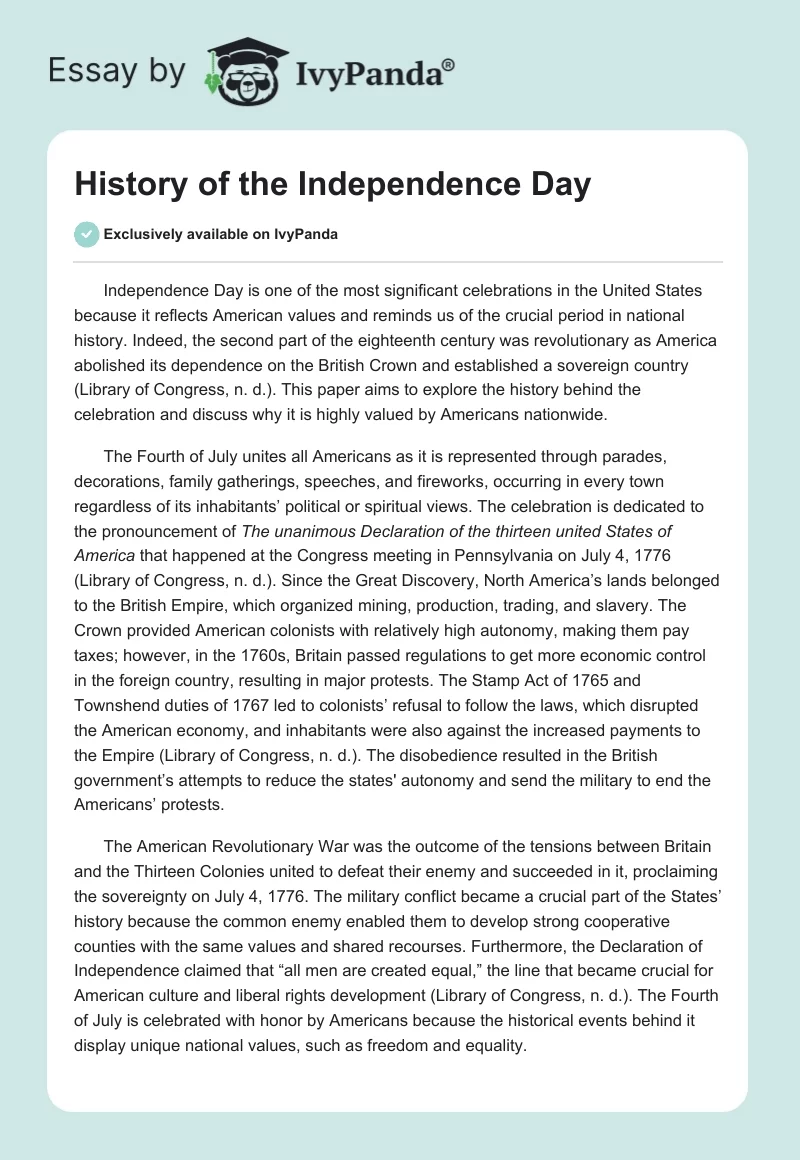Understanding The History And Meaning Of Independence Day

Table of Contents
The Road to Independence: Colonial America and Growing Tensions
British colonial rule in America, while initially offering opportunities, eventually fostered resentment and unrest. Escalating tensions stemmed from a series of policies perceived as unjust and oppressive by the colonists. The seeds of revolution were sown through policies like the Stamp Act of 1765, which imposed taxes on printed materials, and the Townshend Acts, which levied duties on various goods. These acts, coupled with the quartering of British troops in colonial homes, fueled a growing sense of injustice and disregard for colonial rights.
- Taxation without Representation: The cry of "No taxation without representation" became a rallying cry, highlighting the colonists' belief that they should not be subjected to taxes imposed by a parliament in which they had no voice. This fundamental grievance became a central point of contention.
- The Power of the Printed Word: Pamphlets and influential writings, such as Thomas Paine's "Common Sense," played a crucial role in galvanizing public opinion against British rule. These publications effectively articulated the colonists' grievances and fueled revolutionary sentiment.
- Growing Divide: Events like the Boston Massacre and the Boston Tea Party further escalated tensions, marking significant steps toward armed conflict. The colonists' resistance grew increasingly organized and defiant, laying the groundwork for the American Revolution.
The Declaration of Independence: A Pivotal Document
The Declaration of Independence, adopted on July 4, 1776, stands as a pivotal document in American history. Drafted primarily by Thomas Jefferson, with significant input from Benjamin Franklin and John Adams, it articulated the colonists' grievances against King George III and declared their independence from British rule.
- Core Principles: The Declaration eloquently proclaimed fundamental principles such as the right to life, liberty, and the pursuit of happiness, principles that continue to inspire democratic movements around the globe. These ideals formed the bedrock of the new nation's identity.
- Impact on the Revolution: The Declaration served as a powerful declaration of war and a rallying point for the American colonists. It provided a clear and concise statement of the reasons for rebellion and inspired a united front against British forces.
- Lasting Influence: The Declaration's impact extends far beyond the American Revolution. Its principles of self-government, individual rights, and popular sovereignty have influenced countless movements for freedom and democracy throughout the world, making it a truly global symbol of liberty.
The American Revolutionary War: A Fight for Freedom
The American Revolutionary War (1775-1783) was a brutal and protracted struggle for independence. Key battles like Lexington and Concord, Saratoga, and Yorktown marked significant turning points in the conflict. George Washington, as commander of the Continental Army, displayed exceptional leadership and perseverance, guiding the colonists through numerous setbacks to ultimate victory.
- Strategies and Challenges: The Continental Army faced significant challenges, including a lack of resources, training, and a well-equipped military compared to the British forces. Their strategies often involved guerrilla warfare and securing crucial alliances.
- Foreign Support: The crucial support received from France, Spain, and the Netherlands provided much-needed resources and military assistance, ultimately tipping the balance in favor of the Americans.
- Impact on the Nation: The war fundamentally reshaped the social and political landscape of the newly formed nation, leading to the establishment of a republican government based on the principles enshrined in the Declaration of Independence.
Independence Day Celebrations: Then and Now
The celebration of Independence Day has evolved significantly over time. Early celebrations were often more subdued, focusing on civic gatherings and commemorations. However, over time, the holiday has become synonymous with boisterous parades, fireworks displays, and family barbecues.
- Changing Celebrations: From simple town meetings to elaborate displays of patriotism, the evolution of Independence Day reflects societal changes and the evolving understanding of national identity.
- Regional Variations: Independence Day traditions vary across the United States, showcasing the diverse cultural tapestry of the nation. From historical reenactments to unique local events, the celebrations reflect the regional character and history.
- Contemporary Interpretations: In contemporary society, Independence Day continues to evoke a range of emotions and interpretations, prompting reflection on the ongoing struggle for equality, justice, and the ideals of freedom enshrined in the nation’s founding documents.
The Enduring Meaning of Independence Day: Freedom and Responsibility
The ideals of independence and self-governance remain profoundly relevant in contemporary society. Independence Day serves as a reminder of the sacrifices made to secure these freedoms and the responsibilities that come with them.
- Current Social Issues: The ongoing pursuit of freedom and equality continues to be a central theme in contemporary American society. Issues of social justice, civil rights, and economic opportunity remain a testament to the ongoing struggle to live up to the ideals of Independence Day.
- Civic Engagement: The true spirit of Independence Day lies not only in celebration but also in active civic engagement and responsible citizenship. Participating in the democratic process, upholding the rule of law, and working towards a more just and equitable society are all essential elements of honoring the legacy of Independence Day.
- Responsibility and Freedom: The freedoms celebrated on Independence Day come with a profound responsibility to ensure that those freedoms are extended to all citizens and that the principles of democracy are upheld.
Conclusion:
This exploration of the history and meaning of Independence Day reveals a journey of struggle, sacrifice, and ultimately, the triumph of ideals. Understanding this rich history allows us to fully appreciate the freedoms we enjoy today and to actively participate in shaping a future worthy of the sacrifices made. Let's continue to honor the spirit of Independence Day by embracing our responsibilities as citizens and working towards a more just and equitable society. Celebrate this Independence Day with a renewed understanding of its profound significance and continue to learn about the history and meaning of Independence Day.

Featured Posts
-
 Bj Novak And Delaney Rowe A Normal Couple
May 06, 2025
Bj Novak And Delaney Rowe A Normal Couple
May 06, 2025 -
 The 5 Most Outrageous Met Gala Moments We Cant Forget
May 06, 2025
The 5 Most Outrageous Met Gala Moments We Cant Forget
May 06, 2025 -
 5 Weirdest Met Gala Looks Ever
May 06, 2025
5 Weirdest Met Gala Looks Ever
May 06, 2025 -
 Bbc V Azerbaydzhani Prizupinennya Roboti Ofisu V Baku
May 06, 2025
Bbc V Azerbaydzhani Prizupinennya Roboti Ofisu V Baku
May 06, 2025 -
 Garuda Nusantara Raih Posisi 3 Laporan Pertandingan Indonesia Vs Yaman 0 0
May 06, 2025
Garuda Nusantara Raih Posisi 3 Laporan Pertandingan Indonesia Vs Yaman 0 0
May 06, 2025
